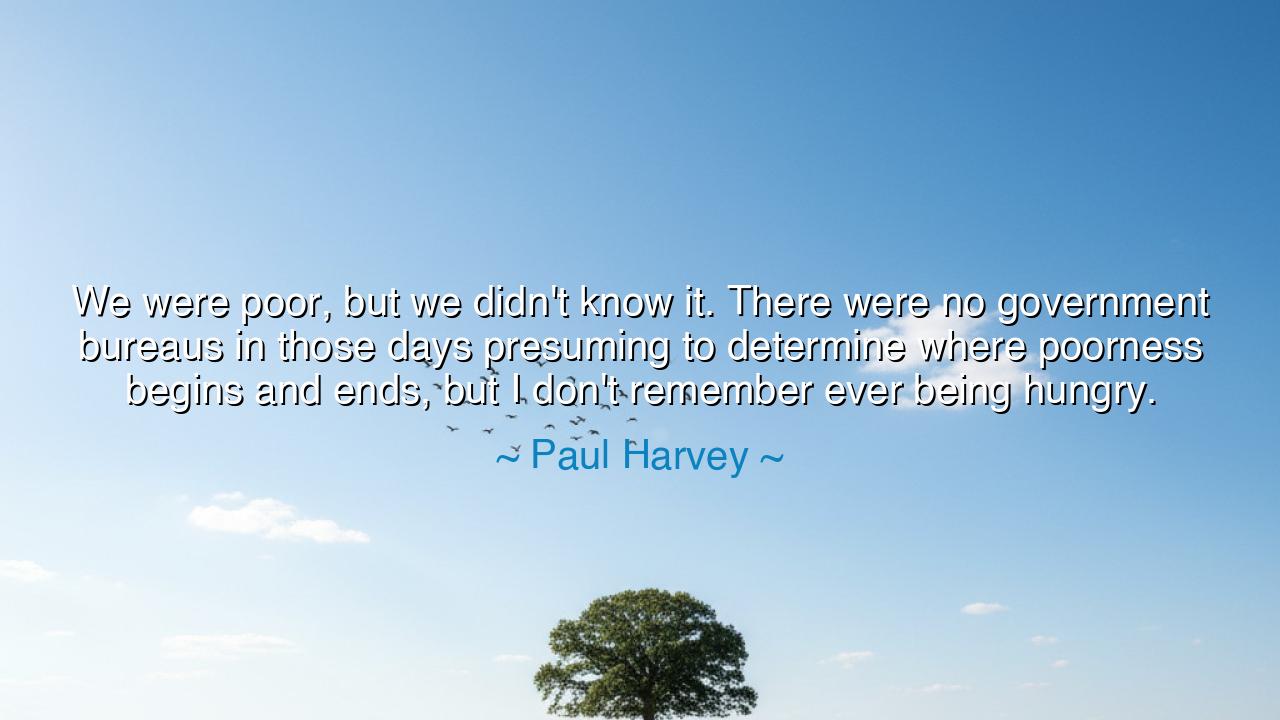
We were poor, but we didn't know it. There were no government
We were poor, but we didn't know it. There were no government bureaus in those days presuming to determine where poorness begins and ends, but I don't remember ever being hungry.






"We were poor, but we didn't know it. There were no government bureaus in those days presuming to determine where poorness begins and ends, but I don't remember ever being hungry." – Paul Harvey
In this humble and poignant reflection, Paul Harvey, the legendary American radio broadcaster, speaks not merely of material hardship, but of the richness of spirit that once defined a generation. His words carry the scent of simpler times—of hard work, neighborly kindness, and quiet dignity. When he says, “We were poor, but we didn’t know it,” he is not denying struggle; he is revealing a truth deeper than economics. He reminds us that poverty of the wallet is nothing compared to poverty of gratitude. His family had little in the way of possessions, yet they were rich in something far greater—contentment, self-reliance, and the unseen wealth of a shared purpose.
The origin of this quote lies in Harvey’s reminiscences of his early life during the Great Depression and the rural American experience of the early twentieth century. Born in 1918 in Tulsa, Oklahoma, Harvey grew up in a world where most families labored for their bread and mended what they had. There were no bureaucrats to measure their poverty, no charts or definitions to tell them they were deprived. They knew only what they had and what they made of it. His words evoke a time when dignity came from work, not welfare, and when community stood in for the safety nets that government later built. He does not scorn compassion—he merely mourns the loss of a world where character, not circumstance, defined a person’s worth.
In the style of the ancients, Harvey’s reflection might be likened to the wisdom of Epictetus, the Stoic slave-philosopher who taught that happiness depends not on what one possesses, but on how one perceives. The poor man who feels no lack is richer than the king who covets more. So too Harvey’s family, though living in want, carried themselves with quiet abundance. They did not measure life by what they lacked, but by what they loved. Their hearts, not their cupboards, determined their wealth.
Consider the story of Laura Ingalls Wilder, author of Little House on the Prairie, whose family also lived with scarcity yet found joy in every dawn. In her childhood, there were winters of hunger and summers of toil, yet her writing glows with gratitude. Her family, like Harvey’s, knew no shame in simplicity, for they saw that poverty shared in love is no poverty at all. They were sustained not by government relief but by faith, endurance, and the kindness of neighbors. From their trials came resilience—the strength of those who know how to live without complaint.
Harvey’s observation also carries a quiet rebuke to the modern age. In a world now trained to measure, label, and categorize every form of lack, we risk losing the deeper meaning of fulfillment. The “government bureaus” he mentions symbolize a society that defines need externally, by statistics and surveys, rather than internally, by gratitude and sufficiency. Today, abundance surrounds us, yet discontent grows. We live longer, eat better, own more—and feel poorer still. Harvey’s words remind us that wealth is not measured by comfort, but by contentment; not by consumption, but by connection.
And yet his tone is not bitter—it is wistful, almost reverent. He does not condemn progress, but cautions against the forgetfulness it breeds. The problem is not that governments care for the needy; it is that in doing so, people may forget to care for one another. In the old days, help came from the neighbor, the church, the family—the human hand and the compassionate heart. Today, systems stand where faces once stood. Harvey’s memory is a plea to rekindle the warmth of community, to remember that love and pride in honest labor once made even poverty noble.
The lesson of Paul Harvey’s quote is timeless: gratitude transforms scarcity into abundance. It teaches that happiness is not found in wealth, but in perspective. To live well, one must first live gratefully. The practical call to us is clear—seek simplicity, honor work, and measure your blessings not by what you own, but by what you can give. Help your neighbor not because law requires it, but because love compels it. For when the heart grows rich in gratitude, the word “poor” loses all meaning.
Thus, Harvey’s words, like an old hymn from the heartland, sing across the ages: that a people who once had little, but lived fully, were never truly poor—and that perhaps, in remembering them, we might once again learn what it means to be truly rich.






AAdministratorAdministrator
Welcome, honored guests. Please leave a comment, we will respond soon